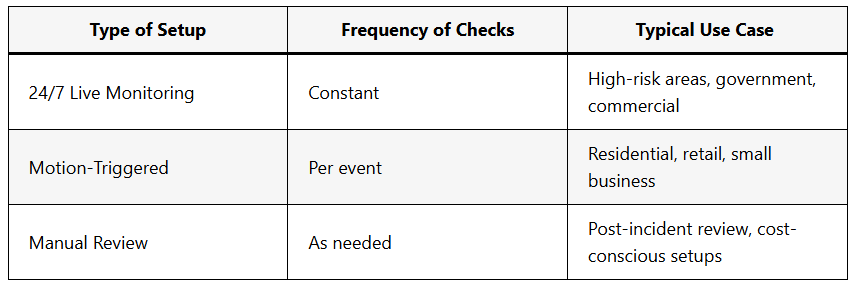Security cameras have become an integral part of modern protection strategies for homes and businesses, but many people still wonder: how often are security cameras checked?
If you’re thinking about installing a system or already have one in place, understanding how these cameras are monitored, how often footage is reviewed, and what triggers a check is essential to keeping your property safe.
Why Security Camera Monitoring Matters
The primary purpose of a commercial security camera is to watch for unusual or suspicious behavior in or around your property. Whether it’s catching shoplifting in a commercial store, deterring theft in a residential area, or recording evidence after an incident, these systems serve as both a preventive tool and a documentation resource.
But even the best camera systems won’t help much if no one checks them. That’s where proper monitoring and review come into play.
How Often Are Security Cameras Checked?
Let’s clarify one important point: not all security cameras are watched in real time. The frequency with which footage is reviewed depends on several factors:
- Purpose of the system – Is it for crime prevention, employee monitoring, or retail loss prevention?
- Type of location – A private home, a high-traffic store, or a government building.
- Level of risk – Places with a higher risk of theft, accident, or data breach require tighter observation.
- System capabilities – Does it include motion detectors, night vision, or smart software?
Here’s how different situations affect how often cameras are checked:
24/7 Security Monitoring Systems
These setups are designed for continuous monitoring, often provided as a service by professionals.
- Live feeds monitored in real-time by a team.
- Trained security guards or operators watch every camera feed during shifts.
- Common in high-security environments like banks or commercial buildings.
Motion-Based or Event-Triggered Monitoring
Some modern systems use software to send an alert when motion or unusual activity is detected.
- Footage is only reviewed if a movement or event happens.
- Efficient for residential use or lower-risk business settings.
- Greatly reduces the need to watch every camera all the time.
Manual Review After an Incident
In some cases, camera footage is only reviewed after something happens:
- Theft, accidents, or reports of suspicious behavior.
- The system continues to record, but no one may actively monitor it unless an incident occurs.
- A common practice in small businesses or private homes that don’t require constant human oversight.
Can You Monitor Your Home Security Cameras Yourself?
Absolutely. Many camera systems today can stream video to your phone via Wi-Fi and allow you to review clips at your convenience. For example, if you’re using a residential video monitoring service like True Home Protection, you can check your camera anytime—day or night.
However, unless you’re able to dedicate time daily, self-monitoring has its limitations:
- You might miss important footage due to false alarms or a lack of attention.
- You’re responsible for timely updates and maintenance.
- It doesn’t replace the benefit of trained professionals actively monitoring your system.
How Professionals Monitor Security Systems
Professional 24/7 service providers have structured protocols in place:
- They use CCTV (Closed-circuit television) or IP cameras across multiple locations.
- Software organizes feeds by area, activity, or event-based triggers.
- Trained personnel review recorded footage as needed.
- System management includes installation, regular check-ups, and performance evaluations.
Depending on the package, you may get:
- Custom design for your specific situation.
- Daily system checks.
- Secure access control options.
- Integrated technology, like motion sensors or night vision.
Factors That Impact How Often Cameras Are Checked
If you’re still wondering how often security cameras are checked, here’s a practical breakdown:

Do You Need to Watch Every Camera Feed?
No, and in many cases, it’s not realistic or necessary. Constant human monitoring is expensive and usually only essential in high-risk environments. For most home or small business owners, a mix of smart detection and periodic checks is enough.
The key is to ensure your setup matches the purpose of your security system. If your main concern is theft or accident detection, opt for smart features. If you’re looking for layered risk management, combine video feeds with access control and professional backup.
Final Thoughts: A Balance Between Automation and Human Oversight
So, how often are security cameras checked? There’s no one-size-fits-all answer, but here’s what we recommend:
- Use motion detectors and smart software to reduce manual effort.
- For high-security areas, consider 24/7 service.
- Always review recorded footage after any incident.
- If you’re not using a professional monitoring service, make it a daily habit to check your dashboard for unusual activity.
If you’re looking for a system that fits your home or business, our team at True Home Protection can help you choose the right tools and approach. Contact us today.
And remember – the point of any security camera system is to keep you, your family, or your organization safe. With the right balance of technology, habit, and expert input, you can rest easy knowing you’re prepared.
